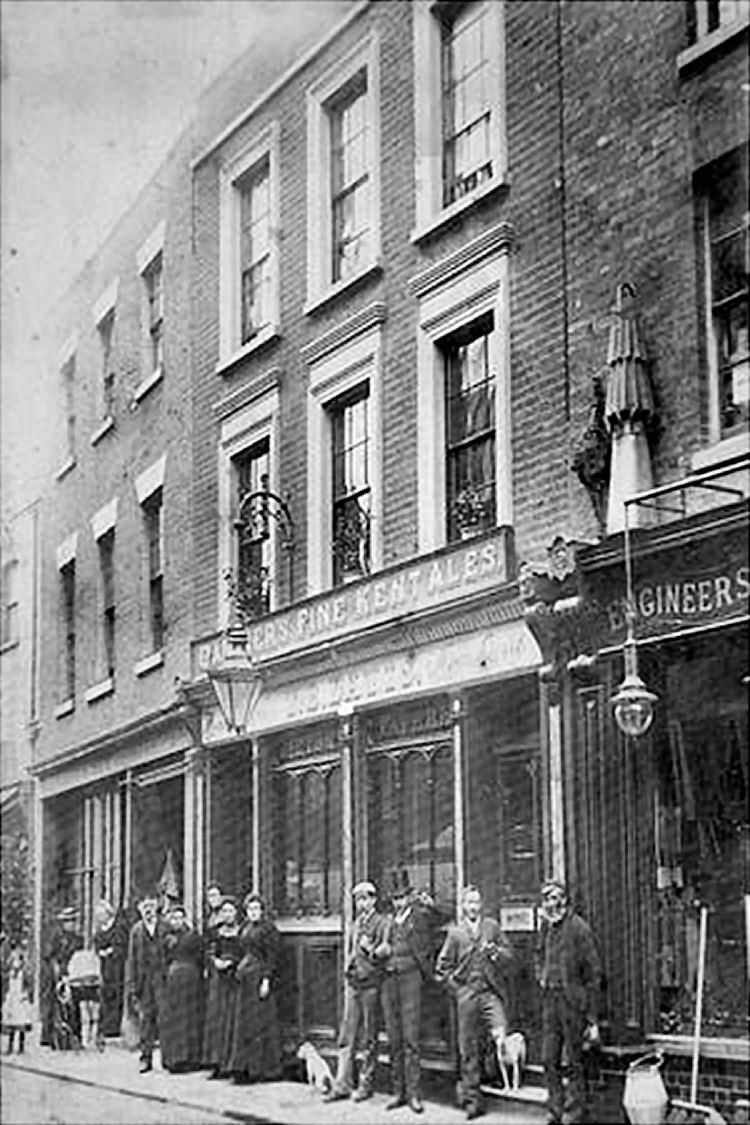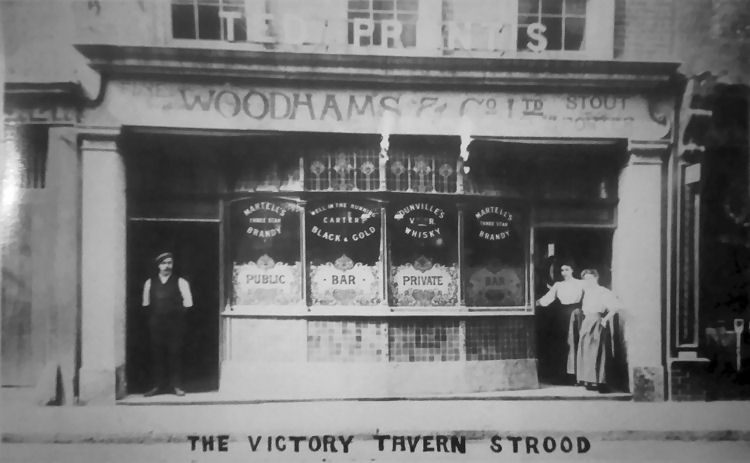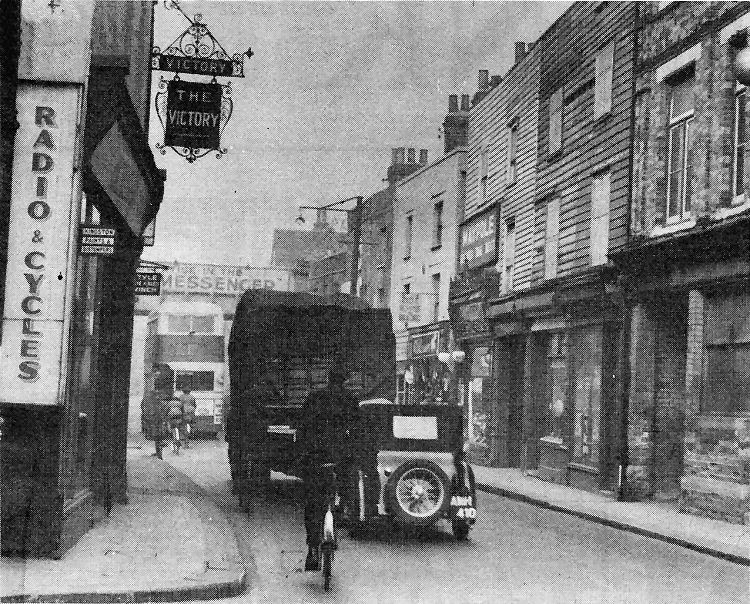|
23 (53) High Street
Strood

Above photo, 1897. |

Above photo, circa 1900, kindly sent by Thomas Thurlow. |

Above photo, date unknown. |

Above photo showing the location in 2012. |
This was mentioned in a book called the "History of Strood" by Henry
Smetham, published 1899, who says this pub was situated to the south side of
the High Street.
|
From the Kentish Gazette 31 July 1838.
A coroner’s inquest was held at the "Victory Tavern," Strood, on
Thursday, the 10th inst. before J. Hinde, esq. coroner, on view of
the body of James Forshew, a little boy aged five years, who was
found floating in the Medway on the Wednesday preceding. The first
witness examined was Mary Forshew, a relation of the deceased, who
deposed that the last time she saw the child alive was on Saturday,
the 14th, about half-past four o'clock in the afternoon, standing by
its mother’s door at play with some other children. At about
half-past six the child was nowhere to be found; inquiry was
immediately made in every direction, and they kept searching for the
boy all night, but without finding him. She heard no more until
Wednesday, when he was brought home a corpse, having been picked up
in the river — she knew the child by its dress. Richard Wickers, a
lad aged sixteen, was then called, and stated that on Wednesday,
about noon, he was on the bank of the river Medway below the quarry,
which is situated about a mile from Rochester-bridge, and saw
something floating on the river. He got a boat-hook and went into
the water and dragged it to the shore, and discovered it to be a
child; he lifted it up, and laid it on the bank, and covered it with
a sail. Having previously heard of little Forshew being lost, he
went and gave information to the parents. Two men were then sent
with him, who brought the child home, and it was immediately
recognised to be the body of the child that was lost on the Saturday
before. In the absence of any proof how the little fellow got into
the water, the jury, after consulting a short time, returned a
verdict of "Found Drowned."
|
|
Kentish Gazette, 16 April 1844.
DEATH.
March 30, Mrs. Attersell, wife of Mr. Attersell, landlord of the
"Victory" public-house, Strood.
|
|
Southeastern Gazette, 19 April 1853.
CITY PETTY SESSIONS.
Wednesday. (Before R. Clements, Esq., Captain Burton, S. Steele,
E. R. Coles, and W. Manclark, Esqrs.)
Alfred Henry Goatley was charged on a warrant with the following
violent assault.
W. Jeffrey deposed that on the night of Saturday last, at a few
minutes before eleven o’clock, he was in the tap-room of the
"Victory" public-house, Strood, his wife being with him. The
defendant suddenly entered the room, and without saying a word
rushed towards the complainant and dealt him a violent blow in the
face, which knocked him down. The prisoner, not content with this,
followed up his attack by striking him under the jaw with a pewter
pot, and under the continued effects of such treatment, complainant
became insensible. The wife, seeing the danger to which her husband
was exposed, rushed forward to shield him, when the ruffian, with a
powerful blow, felled her to the ground, her face coming in contact
with the fender, thereby causing a large wound, which the poor woman
exhibited to the magistrates; he also knocked her in the side when
down. The complainant swore most positively that he had not given
the prisoner the slightest provocation, as to the best of his
knowledge he had never once seen him before.
In answer to a question by Mr. Steele, the witness reiterated his
statement that he had given prisoner no cause for the violent attack
on him.
Caroline Jeffrey, the wife of complainant, fully confirmed her
husband’s statement, and added that the prisoner declared "he would
kill the first b------ he came nigh of Formby’s brickers." She also
stated that the prisoner wished to set his wife (who is a powerful
masculine woman) on her (witness), at the same time threatening to
"go into" her if she did not. The wife, however, refrained from
molesting her. A policeman was then sent for.
Henry Nott was in the public-house, and fully corroborated the
last two witnesses’ statements.
The prisoner, a heavy determined looking man, who has the
character of being the terror of all the inhabitants of Strood,
pleaded intoxication, and urged the assaults were not so serious as
had been given out.
The magistrates, having deliberated a short time in private,
determined to remand the prisoner to give time for the apprehension
of prisoner’s companion Langford.
|
|
Southeastern Gazette, 19 April 1853.
Saturday. (Before Capt. Burton, B. R. Coles, S. Steele, and R Winch,
Esqrs.)
The Assault at Strood.
Alfred Henry Goatley and George Langford were then charged with
violently assaulting William Jeffrey and his wife at Strood. The
first named prisoner had been examined on Wednesday, and was then
remanded to give time for the apprehension of Langford. Mr. H. C.
Stephenson, of Sheerness, appeared for Langford.
The evidence of Jeffrey and his wife was merely a recapitulation of
that given on Wednesday. With regard to Langford both witnesses now
swore that he came in with a poker under his waistcoat, threatening
to kill some one. He then went out, and in a few minutes came back
with Goatley, when they both commenced an unmerciful attack on the
prosecutors, as noticed in our Wednesday’s report. The wife of
Jeffrey was knocked down by one of the prisoners, and kicked and
beaten by the other, which was evidently proved by the marks which
she now bore. In their cross-examination both these witnesses swore
they never saw the prisoners before, and that they neither did nor
said anything to annoy them. They were also perfectly sober.
Henry Nutt, who was in the tap-room of the "Victory" at the time
gave corroborative evidence, though he could not swear to all the
facts, as he was absent for two periods.
Mary Strong, the servant at the "Victory," was called to give
support of the complaint, but as she had been treated badly and had
evidently been tampered with, the magistrates had little reliance on
her evidence, Mr. Coles administered observations to her.
The magistrates said the assault was far too serious to deal with;
they had therefore determined to judge it at another time.
There was also another case against the prisoner and Silas Wood at
the "Ship" public-house, which for form the basis of the indictment.
|
LICENSEE LIST
PEARSON Luke 1832+

CROCKFORD Thomas Samuel 1841+
 (age 35 in 1841
(age 35 in 1841 ) )
ATTERSOLL Henry Bull 1851-81 (Licensed Victualler age 71 in 1881 ) )
ATTERSOLL William 1881+ (age 33 in 1881 ) )
ATTERSOLL Henry Bull 1882+
ATTERSOLL William 1891+ (age 43 in 1891 ) )
PRENTIS Edward 1900? (father was
James
William Prentis)
BROOKER Frederick 1901+ (age 24 in 1901 ) )
COSSEY G H 1903+

COSTIN J C 1913+
HOLLANDS John William 1918-22+
PALMER Frederick G 1930+
COLLINS William Thomas 1938+
PRIDHAM William H 1955+
https://pubwiki.co.uk/VictoryTavern.shtml
 From the Pigot's Directory 1832-33-34 From the Pigot's Directory 1832-33-34
 From the Kelly's Directory 1903 From the Kelly's Directory 1903
 Census Census
|



